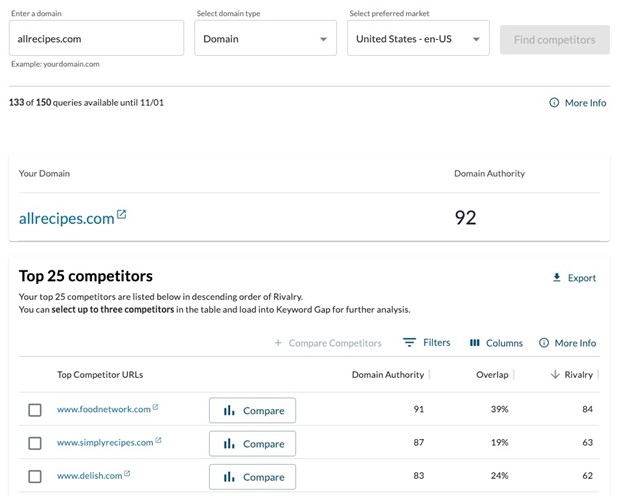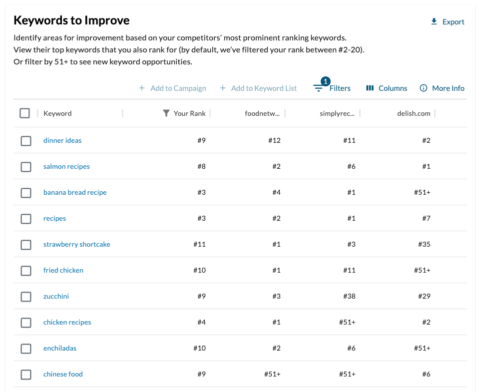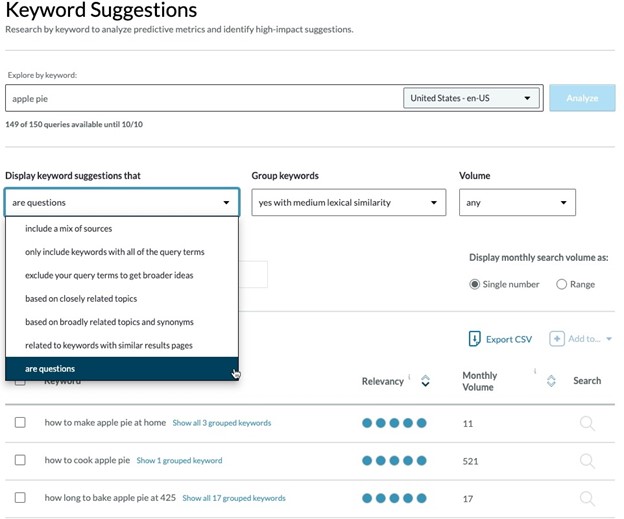Keyword research is often thought of as the keystone of SEO and provides the foundation for many SEO strategies. After all, how can you optimize your website for search engines if you don’t know what people are searching for and what results pages your site populates?
Whether you’re new to SEO or you’ve been doing it for years, chances are that you perform keyword research on the regular.
So the question is – in what ways can you make your process even better?
Regardless of where you are in your SEO journey, we’re willing to bet you’ll find a new tip here that will help you step up your game or eliminate an unnecessary step in your workflow.
The following are three ways to add efficiency and effectiveness to your keyword research today and discover some golden opportunities.
1. Go For Quality, Not Quantity.
Start here:
- Identify your SERP competitors.
- Analyze keyword overlap.
- Determine keywords within striking distance.
It’s tempting to pull all the keywords that there ever were into a spreadsheet and go from there. But when time is limited and results are needed pronto, you must work smarter. Luckily, tools have been invented to help you in this effort.
So, what do we mean by quality?
While quality is subject to your business objectives, generally speaking, you’ll be looking at how you can be more visible in search results compared to your actual business competitors, or whoever is currently ranking on the first page for the keywords and topics that you have a solution for. So, you can start there.
Understand who your true SERP competitors are (those unexpected players who show up in results for your target keywords) before you make any assumptions. Assess them by the percentage of keywords you share and/or have overlap with. At Moz, we offer a quick and easy metric for this – try stack ranking by Rivalry score.
 Screenshot from Moz.com, October 2022
Screenshot from Moz.com, October 2022Next, compare those top competitors in a keyword gap tool to identify the keywords where you’re within striking distance of page 1.
 Screenshot from Moz.com, October 2022
Screenshot from Moz.com, October 20222. Automate Your Grouping Process.
A list of relevant keywords is a great start, but you can end up with a long list of very similar phrases that naturally overlap. To drive actionable SEO and content strategy, grouping similar keywords together is important to understand how many pieces of content you need to create or improve.
- Identify your seed keyword.
- Filter by source type.
- Group similar keywords.
The process of grouping keywords allows you to identify keywords that may have a similar intent.
For example, someone searching for “apple pie recipes” may have the same search intent as someone searching for “how to make apple pie.” By grouping these keywords together, you may be able to identify opportunities to target multiple keywords at once.
Grouping keywords manually can be labor intensive, depending on how many keywords you’re working with. If there’s a tool that simplifies the process you’re currently doing on your own in Excel, use it! There’s a reason SEO software exists, after all. The more time you can cut down on manual labor, the more clients you can support, and the more time you can spend on other SEO tasks.
Rather than sifting through your giant ambiguous list of keywords to form groups of alike keywords, use a keyword grouping tool to help you zero in on the types of keywords and phrases that will help your content team deliver.
Moz’s Keyword Explorer makes this step as easy as pie with the keyword suggestions filtering functionality. After entering your seed keyword to return suggestions, filter from a list of suggestion types, including keywords that ‘are questions’. You can then group by varying degrees of lexical similarity and volume range to really hone it in.
 Screenshot from Moz.com, October 2022
Screenshot from Moz.com, October 2022